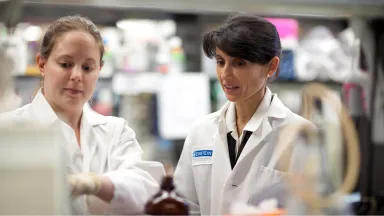
Sridhar Mani, M.D.
- Professor, Department of Oncology (Medical Oncology)
- Professor, Department of Medicine (Oncology & Hematology)
- Professor, Department of Molecular Pharmacology
- Professor, Department of Genetics
Area of research
- Role of Microbiome-Host Interactions in Physiology and Disease, Orphan Nuclear Receptors in Physiology and Disease, Gastrointestinal Cancer, Drug Discovery and Development
Phone
Location
- Albert Einstein College of Medicine Jack and Pearl Resnick Campus 1300 Morris Park Avenue Chanin Building 302-D1 Bronx, NY 10461
Research Profiles
Professional Interests
Pregnane X Receptor (PXR) [a.k.a the Steroid and Xenobiotic Receptor (SXR)] is a master nuclear receptor regulator of host xenobiotic/endobiotic metabolism, detoxification and inflammation. More recently, we have shown that the receptor plays a major role in relaying host microbial signals in the intestines with innate immunity. Specifically, we have shown that microbial metabolites of L-tryptophan, indoles and indole propionates, activate PXR in intestinal epithelial cells to promote intestinal immune homeostasis via a TLR4 specific pathway*. This discovery has led our laboratory into new directions primarily focused on molecular mechanisms governing host-microbial and microbial-microbial relationships in the intestines (similar approaches could be used elsewhere or for other physiologic-pathophysiologic conditions).
1. Discovery of endobiotic PXR ligands and use of microbial metabolite mimicry to design drugs combating intestinal inflammation and cancer. Here we are investigating how different microbial metabolites bind and activate and/or antagonize PXR function in the intestines with the hopes of establishing a physiologic role for microbial metabolites in mammals. In parallel, we have embarked on chemical biological approaches to discovery of indole propionate analogs as potent PXR ligand agonists, with the eventual hope of designing small molecule drugs (microbial metabolite mimicry) combating intestinal inflammation and inflammation-induced cancer**. More recently, the role for indole metabolites connect the gut microbes to neuronal function partly via PXR***. We are also interested in covering all other human receptors in regards to microbial metabolite effects.
2. Discovery of new (novel) microbes and mechanisms governing its regulation of innate immunity. Here we are interested in deciphering molecular mechanisms of indole metabolites as well as small molecule indole mimics as they interact with the host microbiome (e.g., biofilms, drug resistance etc.) in conditions of homeostasis and intestinal stress. These types of investigations have led to the identification of a novel bacterial strain with a unique community phenotype that alters intestinal inflammation. We have diversified our interests to the study of how and why these novel bacterial strains arise during inflammation, what regulates their swarming behavior, and how they execute a phenotype in mice$. Finally, our goal is to derive probiotic approaches, harnessing our internal microbiome, for the treatment of a variety of health conditions. These projects have led to multidisciplinary approaches of designing probiotic drug delivery systems using physics of bacterial spreading, molecular microbiology and host biology$$. We are also interested in bar coded recording of transcriptional events in probiotics and pathogens.
Selected Publications
Representative Publications
* Venkatesh M, Mukherjee S, Wang H, Li H, Sun K, Benechet AP, Qiu Z, Maher L, Redinbo MR, Phillips RS, Fleet JC, Kortagere S, Mukherjee P, Fasano A, Le Ven J, Nicholson JK, Dumas ME, Khanna KM, Mani S. Symbiotic Bacterial Metabolites Regulate Gastrointestinal Barrier Function via the Xenobiotic Sensor PXR and Toll-like Receptor 4. Immunity 41(2): 296-310 (2014)
** Dvorak Z et al (40 authors), Mani S*. Targeting the Pregnane X Receptor Using Microbial Metabolite Mimicry. EMBO Molecular Medicine (Cover Page Citation) 12(4):e11621(2020)
** Dvorak Z, Sokol H, Mani S. Drug Mimicry: Promiscuous Receptors PXR and AhR, and Microbial Metabolite Interactions in the Intestine. Trends Pharm Sci (Cover Page Citation) 41(12): 900-908 (2020)
*** Serger E et al (primary work from the Giovanni lab, Imperial College, London). The gut metabolite indole-3 propionate promotes nerve regeneration and repair. Nature Jun 22 doi:10.1038/s41586-022-04884-x (online ahead of print 2022)
$ De A, Chen W, Li H, Wright JR, Lamendella R, Lukin DJ, Szymczak WA, Sun K, Kelly L, Ghosh S, Kearns DB, He Z, Jobin C, Luo X, Byju A, Chatterjee S, San Yeoh B, Vijay-Kumar M, Tang JX, Prajapati M, Bartnikas TB, Mani S. Bacterial Swarmers Enriched During Intestinal Stress Ameliorate Damage. Gastroenterology 161(1):211-224. doi: 10.1053/j.gastro.2021.03.017 ( 2021)
$$ Chen W, Mani N, Karani H, Li H, Mani S, Tang JX. Confinement discerns swarmers from planktonic bacteria. Elife 10:e64176 (2021)
Most Recent: Ondrová K, Zůvalová I, Vyhlídalová B, Krasulová K, Miková E, Vrzal R, Nádvorník P, Nepal B, Kortagere S, Kopečná M, Kopečný D, Šebela M, Rastinejad F, Pu H, Soural M, Rolfes KM, Haarmann-Stemmann T, Li H, Mani S, Dvořák Z. Monoterpenoid aryl hydrocarbon receptor allosteric antagonists protect against ultraviolet skin damage in female mice. Nat Commun. 2023 May 11;14(1):2728. doi: 10.1038/s41467-023-38478-6. PMID: 37169746; PMCID: PMC10174618.





